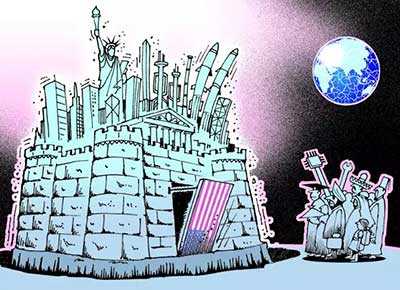Relevance: GS-2: India and its neighbourhood – International relations, Bilateral, regional and global groupings and agreements involving India and/or affecting the Indian interests
Key Phrases: Warsaw Pact, Interconnected World, Make in India, Nationalistic Policies, New Rules-based World Order, Made in China 2025, Western definition of globalization, North Atlantic Treaty Organization, Weakened State of Dollar
Why in News?
- The war in Ukraine has exposed the misconceptions that were inherent in the project of globalization.
Key Highlights:
- The term ‘globalization’ may have been born earlier, but became popular in the 1990s.
- It reflected a freer trade regime, global supply chains, and an interconnected world.
- It was supposed to build more peaceful earth after 45 years of Cold War angst.
- After the collapse of the Soviet Union, the people of the Warsaw Pact countries in Eastern Europe had overthrown their dictators and moved towards democracy, and liberal values seemed to have won in both the political and economic arenas.
Fallacies of the Globalisation:
- Absence of Rules in the New Rules-based world order:
- The terms of globalization were all negotiated and decreed by the West.
- When the US and its allies invade Iraq for insubstantial reasons, the rest of the world is expected to show the support, but when Russia attacks Ukraine, for concerns it has been articulating for at least 15 years, it is thrown out of the global banking system, its sovereign funds and properties of private Russian citizens are seized, and Russian sportsmen are banned.
- Yet, the West continues to buy Russian oil, gas and coal while lecturing 80% of the planet’s population to shun all Russian products.
- The Ukraine war has made it clear that the ‘world order’ is actually a Caucasian compact between North America and Western Europe.
- Subversion of Global Rules by China with Impunity:
- China has gained the most from globalization.
- With the opening up of the Chinese market in the late 1980s, Western firms rushed in favourably, setting up factories and transferring precious technologies.
- It is fair to say that throughout the 1990s and much of the 2000s, the West and especially the US funded China’s rise.
- China today produces more than 25% of everything manufactured on our planet.
- It started with labour-intensive low-tech components and apparel but has now a significant share in state-of-the-art products.
- Shanghai is the busiest port in the world.
- Covid lockdowns in China threw global supply chains into disarray, causing price rises and shortages in categories as varied as toys and automobiles across the world.
- China is very well aware of the power that it wields and has been pursuing an aggressive ‘Made in China 2025’ programme that will make it even stronger and less dependent on imports.
- It also held a 60% global market share in 2021 in the production of rare-earth metals, which are becoming increasingly critical in sunrise areas like batteries, electric vehicles, and wind turbines.
- Beijing has been consolidating its rare earth industry into a few giant state-owned corporations, creating a political tool that it could one day perhaps use in its relations with Washington and the West.
- This may constitute a long-term threat to the Western definition of globalization.
- Whatever rules the West had formulated for the new world order, China has subverted with impunity.
- Bilateral trade agreements taking place of multilateral treaties:
- International trade itself as a percentage of world gross domestic product peaked in 2008 and shows no signs of recovering its peak, according to the World Bank.
- The World Trade Organization has not taken any new global trade initiative in over a decade.
- Even sub-global trade deals like the Trans-Pacific Partnership or US-European Union (EU) Transatlantic Trade and Investment Partnership have collapsed.
- These multilateral treaties are increasingly being replaced with bilateral trade agreements, such as the one recently signed by India and Australia.
- Rise of Nationalistic Policies:
- Over the last decade, many countries around the world have been adopting nationalistic policies rather than adhering to the grand vision of globalization unifying the planet under a single economic and eventually single political system.
- These range from Brexit and Donald Trump’s ‘America First’ to India’s ‘Make in India’ and ‘Atmanirbhar Bharat’ initiatives.
- The present government appears to draw its foreign policies now from ‘realist’ international relations theory, which recommends that nations act solely in their rational self-interest and in a transactional manner.
- These efforts will only strengthen after the Ukraine war, which has exposed the capriciousness underlying global financial and trade frameworks.
- Weakening of Dollar as the Default Global Currency:
- EU nations are buying Russian oil, gas, and coal with roubles.
- Brazil, which imports 85% of its fertilizers and is largely dependent on Russia for potash and other key fertilizer components, is reportedly considering upping Chinese fertilizer imports or implementing a yuan payment system.
- All this is signifying the weakened state of the dollar as the global default currency.
Conclusion:
- Now, the developing countries like India cannot be sure that they will not be cut off from the international banking system overnight or their sovereign funds would not be seized at the stroke of a pen if it is forced to take military action that is not to the West’s liking, or even in response to a major domestic upheaval.
- The best way to guard a nation is to grow its economy fast and furiously.
- Globalization may well never be the same again after Ukraine, but money will always be the loudest voice at any negotiating table.
Source: Live-Mint
Mains Question:
Q. The war in Ukraine has exposed the misconceptions that were inherent in the project of globalization. Discuss. (250 words).








